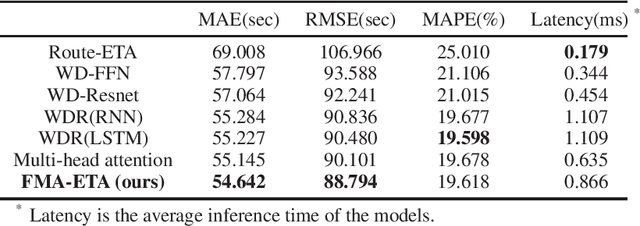FMA-ETA: Estimating Travel Time Entirely Based on FFN With Attention
Paper and Code
Jun 07, 2020



Estimated time of arrival (ETA) is one of the most important services in intelligent transportation systems and becomes a challenging spatial-temporal (ST) data mining task in recent years. Nowadays, deep learning based methods, specifically recurrent neural networks (RNN) based ones are adapted to model the ST patterns from massive data for ETA and become the state-of-the-art. However, RNN is suffering from slow training and inference speed, as its structure is unfriendly to parallel computing. To solve this problem, we propose a novel, brief and effective framework mainly based on feed-forward network (FFN) for ETA, FFN with Multi-factor self-Attention (FMA-ETA). The novel Multi-factor self-attention mechanism is proposed to deal with different category features and aggregate the information purposefully. Extensive experimental results on the real-world vehicle travel dataset show FMA-ETA is competitive with state-of-the-art methods in terms of the prediction accuracy with significantly better inference speed.
 Add to Chrome
Add to Chrome Add to Firefox
Add to Firefox Add to Edge
Add to Edge